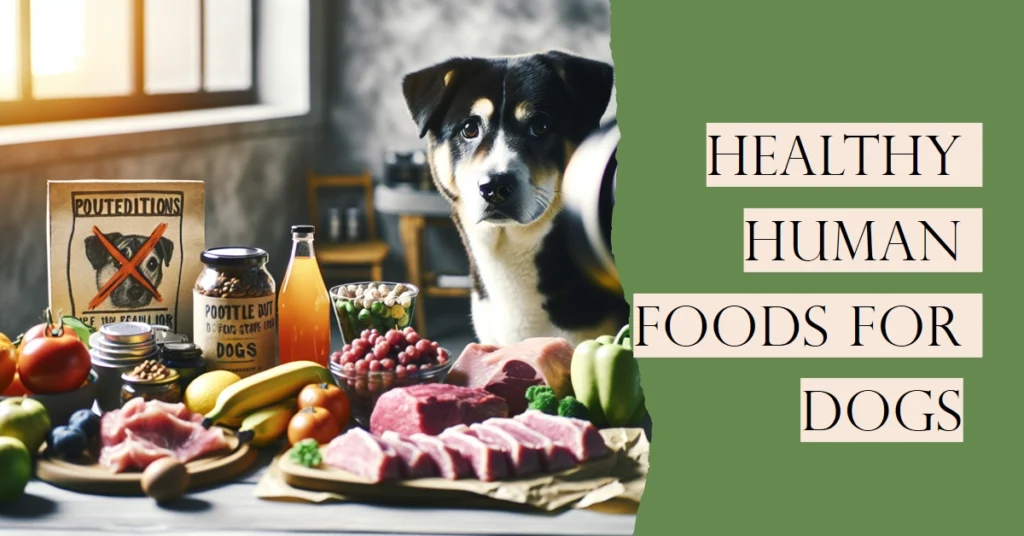
Many people who have dogs like to give them some human food, sometimes as a snack or sometimes with their normal food. This can be good or bad for dogs – some human food can make them sick, but some can make them healthy.
This article will tell you about some of the best human food for dogs, and also some things you need to be careful about when you feed your dog human food.
Health Benefits of Certain Human Foods for Dogs
Protein-Rich Foods
Some meats like chicken, turkey, fish, and eggs are very good for dogs because they have a lot of protein.
Protein has things called amino acids that help dogs keep their muscles strong and healthy. This is very important for dogs that run a lot or are still growing.
For example, older dogs may lose some of their muscles and need more protein. Some other human foods that have a lot of protein are plain Greek yogurt and low-fat cheese. Yogurt has good bacteria that help dogs’ stomachs and immune systems, while cheese has calcium that helps dogs’ bones.
Fruits and Vegetables
Some fruits and veggies like apples, blueberries, carrots, green beans, sweet potatoes, and cucumbers are good for dogs because they have important things that dogs need to be healthy.
For example, carrots have vitamin A that helps dogs see better and fight off germs, and also fiber that helps dogs poop better and stay in shape. Blueberries have vitamin C, manganese, and antioxidants that help dogs’ cells stay healthy.
Some other good fruits and veggies for dogs are pumpkin (vitamin A, fiber), broccoli (vitamin C, calcium), and bananas (potassium, magnesium). It’s better to give dogs fruits and veggies raw or cooked a little bit without any salt or spices.
Peanut Butter
Unsalted peanut butter is a tasty treat that’s typically harmless for dogs. It supplies niacin, vitamin B, vitamin E, plant-based protein, and healthy monounsaturated fats. Peanut butter can also help dogs take medication. However, it’s high in calories, so only small servings should be used to prevent obesity. Look for all-natural peanut butter without extra sugar or sweeteners added.
Cheese
Some cheeses that are low in fat and salt like mozzarella, cheddar, Swiss, and cottage cheese are OK to give dogs sometimes.
Cheese has a lot of protein, which is good for dogs, and also calcium and vitamin D, which help dogs’ bones. Give your dog a small piece of cheese at first and see how their stomach feels. Don’t give them cheese that has a lot of spices.
Nutritional Value of Human Foods for Dogs
Overview of Dog Nutrition Needs
Some experts say that for most dogs, the best food has about
- 30% of calories from protein
- 63% from fat
- 7% from carbs
But different dogs may need different amounts of these things depending on their type, size, age, and how much they run or play. Dogs are good at eating what they need when they have different kinds of food to choose from.
Meeting Nutritional Requirements
Some examples of nutritious human foods that can help meet canine nutritional needs:
Protein
- Cooked lean chicken
- Hard boiled eggs
- Plain Greek yogurt
- Low-fat cheese cubes
Fruits/Veggies
- Baby carrots
- Chopped apple
- Green bean pieces
- Cooked sweet potato
Calcium
- Shredded cheese
- Plain yogurt
- Small cottage cheese spoonfuls
This mix of quality protein sources, fresh produce, and dairy foods helps provide complete and balanced nutrition for dogs. Variety is key!
Precautions Around Human Foods for Dogs
While certain human foods are healthy for dogs, there are also important safety precautions to consider before feeding people food.
Foods to Avoid
Some foods can be extremely toxic and even fatal to dogs, including:
- Chocolate
- Grapes
- Raisins
- Onions
- Garlic
- Xylitol (artificial sweetener)
Some foods can make dogs very sick, even if they eat a little bit. These foods include chocolate, grapes, onions, and xylitol.
Don’t give dogs food that has a lot of fat, salt, or spices. Also, don’t give them food that is good for humans but bad for dogs, like milk, oranges, and raw dough.
Prevent Unhealthy Weight Gain
It’s vital to stick to small, measured serving sizes of human foods to prevent obesity and related diseases. Gradual transitions between foods also allows dogs’ digestive systems to adapt. Consult your vet if your dog becomes overweight.
Monitor for Allergic Reactions
Pay close attention for any signs of allergies or intolerance when introducing new foods to your dog’s diet. Reactions can include vomiting, diarrhea, itchy skin, ear infections, and skin irritation. Keep a log of foods fed and symptoms noticed. If reactions occur, stop feeding the problem ingredient and talk to your vet.
Conclusion
Some human foods like meat, cheese, fruits, and veggies are good for dogs if you don’t give them too much.
These foods have things that dogs need to be healthy, like protein, vitamins, minerals, fiber, good bacteria, and antioxidants.
But you need to be careful about what human foods you give your dog and how much. Some human foods can make your dog sick or allergic.
You also need to make sure your dog eats mostly dog food that has everything they need. And you should always ask your vet what kind of food is best for your dog.
If you know what to do, giving your dog human food can be a fun and healthy way to show them you love them.







